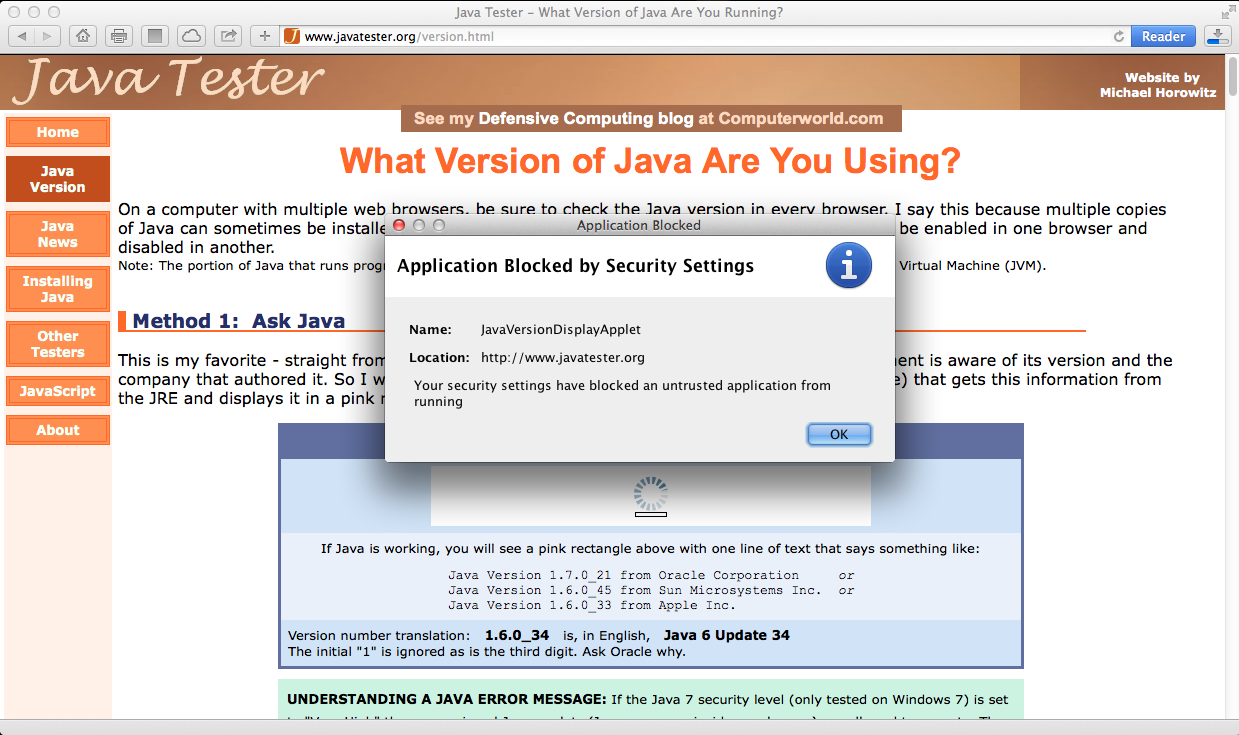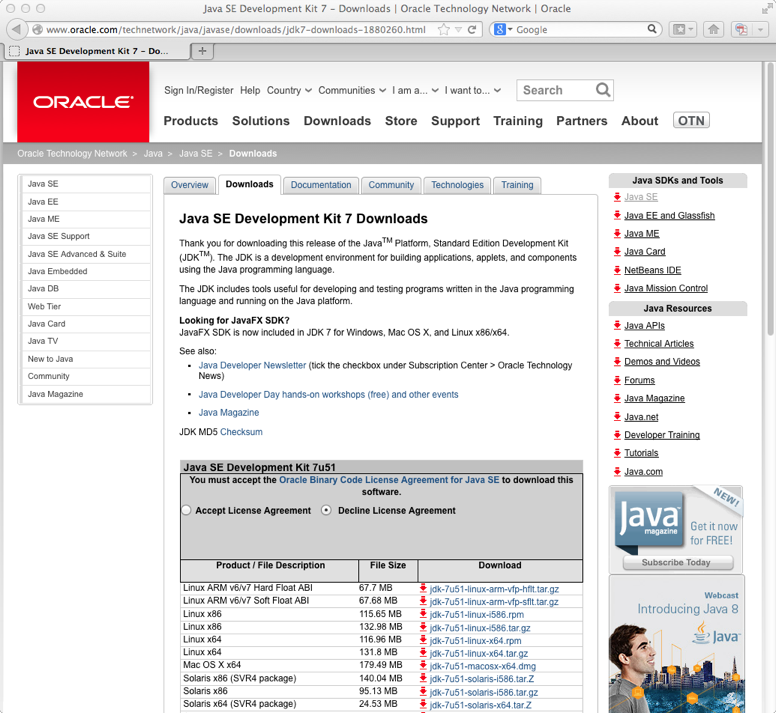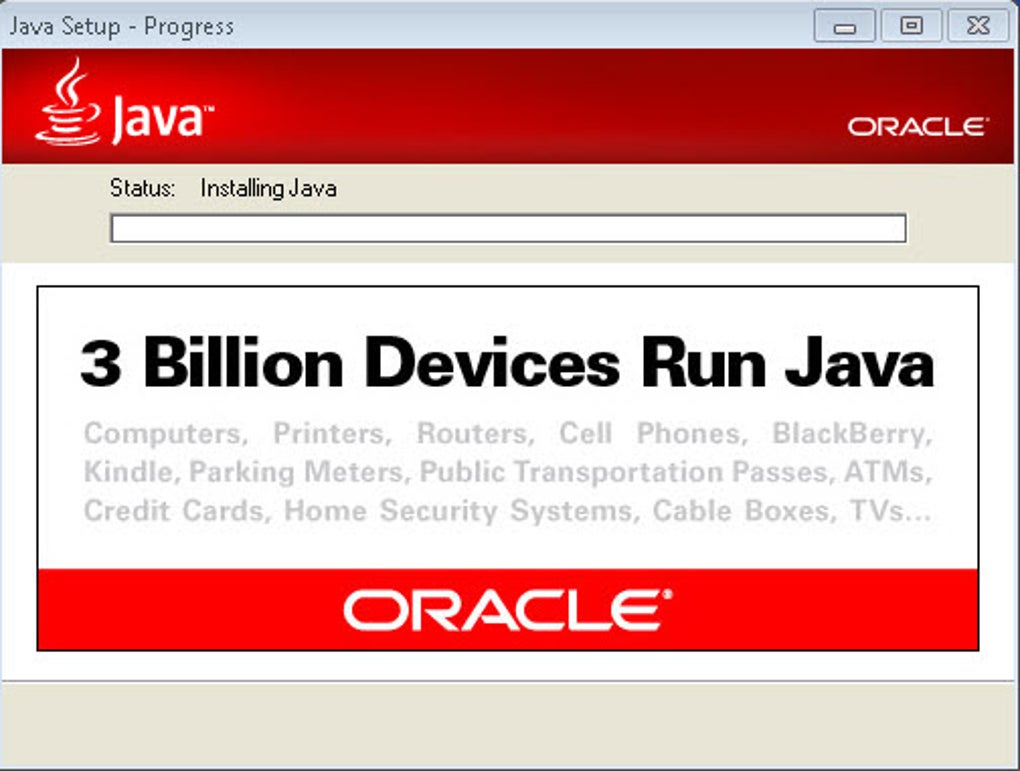Java Jre 8 Update 51 Download For Mac
Java Vulnerable Java, along with Flash and Adobe Reader,. Mac and Linux users now share that vulnerability. Remove Java if you don't need it. If installed, be sure to frequently update it and to. Oracle has released a massive Critical Patch Update (CPU) for July 2018, addressing 334 security vulnerabilities covering a vast swathe of its enterprise portfolio. Of the 334 vulnerabilities covered this month, 61 are rated critical, with a CVSS rating between nine and 10. — Future Browser Support Deprecated Oracle has starting with version 9 (released in September 2017 and no longer supported).
If installed, I recommend disabling the Java plugin in your web browser — enabling it ONLY for trusted sites. Java Maintenance Update Java Regularly Update Java whenever updates are available.
These releases fix security flaws in Java. Version 9 & Later Not Supported in Browsers Version 9 removed all support for browser plugins, primarily because the major browsers no longer support them, largely a result of the rapidly growing mobile market that never supported Java.
Java versions and are short-term (half-year) releases after which a longer term will be released in September 2018. Avoid Third-party Software Prevent Java Updater from installing third-party software. Open the Java Control Panel: Start ⇒ Control Panel ⇒ Java. If you see categories in the Control Panel, look for Java in Programs.
Click on the Advanced tab. Scroll down to the Miscellaneous section at the bottom and place a check mark in “Suppress sponsor offers when installing or updating Java.” If you uninstall Java, this setting will be removed, but as long as you de-select any optional software when downloading new Java versions and check during installation you shouldn't see third-party software installed on your system. Uninstall Older Versions I recommend uninstalling all previous versions of Java when updating. Old and unsupported versions of Java are a serious security risk and can leave your system vulnerable.
Uninstalling older versions of Java from your system ensures that Java applications will run with the latest security and performance improvements on your system. — Java Updater May Not Remove Older Versions Java's updater, leaving your system vulnerable. Oracle provides instructions for. I recommend that you that older versions have been removed from your system. Uninstall Option During Update During installation of a new version, you should see the option to uninstall older versions: You can also run the. See also, Uninstall Java when Updating To secure your computer I recommend that you manually uninstall all current versions, cleaning out any remaining Java-related AppData entries before installing the so you're running only the most recent version. Manually Checking for Older Versions Alternatively, you need to check to see if option to uninstall older versions has removed all older versions.
In either case, I recommend cleaning up the Java folders in AppData. Cleaning Up AppData Java Folders You need to be careful when following the instructions in this section. You can seriously harm your Windows installation if critical files are removed. After running Java's Uninstall Older Versions option, I still found an obsolete Java version in the Sun AppData folder: This image if for illustrative purposes only. When this image was captured Java 8 Update 51 was the current version but is now obsolete.
Cleaning Up Java Folders in AppData Be sure you've either uninstalled Java (all versions) or have run the option to uninstall outdated versions before proceeding. Like most Windows programs, Java keeps data in AppData (in folders labelled Oracle and Sun in the LocalLow folder). To clean up obsolete Java folders, follow these instructions:. Navigate to the Java folders by opening the AppData then LocalLow folders. Look for the Oracle and Sun folders and delete the appropriate folder(s):. If you've uninstalled Java completely, you can delete both the Oracle and Sun folders.
If you've only removed outdated versions, open the Sun folder then delete any folders containing older versions that is present (the jre1.8.45 folder in the above example). Locating AppData The AppData folder is located in C: Users user AppData. Navigate to the C: drive then open the Users folder and look for a folder with your user name.
Inside you'll see the AppData folder (if you've made hidden files and folders visible). Windows 10 users can use File Explorer to view the AppData folder. Windows 7 users can open their User folder (often located on their desktop) to view the AppData folder: AppData Hidden by Windows The AppData folder is normally hidden by Windows. Windows 7 users can change this in the Folder Options in Control Panel to show hidden files, folders and drives in the View menu. Windows 10 users can change this in File Explorer Options (search for “File Folder Settings”). Check “Show hidden files, folders and drives” in the View menu.
Firefox & Java Security Browsers No Longer Support Java In current versions of Firefox, NPAPI-based plugins are blocked. This includes the removal of support for Java. Beginning in Firefox version 52 released March 7, 2017, installed NPAPI plugins are no longer supported in Firefox, except for Adobe Flash. Some of the plugins that will no longer load in Firefox, even though they may be installed on your computer, include Java, Microsoft Silverlight and Adobe Acrobat.
— Oracle Stops Support for Browser Plugins Most current browsers no longer support Java plugins and Oracle has responded by starting with version 9 (released in September 2017 but already obsolete). Java 8 continues to be available, but will now be the last remaining version of Java available to consumers that will support browser plugins. The functions these plugins provided is now primarily but sites requiring Java or similar discontinued technologies will no longer work. How to Use Java if it is Blocked Mozilla support provides instructions on (e.g. For Pogo.com). This workaround will not allow you to run Java in Firefox version 52 or later.
is recommended if you need to run Java on sites like Pogo. Opera links to Java 9 which is no longer supported (download version 8 from Oracle instead). Internet Explorer 11 is, but should not be used for regular surfing because it is both vulnerable and deeply tied into Windows. Pogo now has three classes of games based upon their requirement for,.
In the near future only the HTML5 versions will continue to work because of changing technology. I found Pogo's documentation for running Java was not current and didn't help with Firefox. Java Downloads Update to the Most Recent Version Because are discovered all the time, it is recommended that you regularly update to the latest Java version and ensure. Download Java This the area most consumers should choose to download the latest version of Java specific for their operating system:. The page has offline installers for various installations. You can test your Java installation on the page if your browser supports Java plugins. Download More Recent Java Versions The more recent versions of Java (currently Java 10) are and include JDK, Server JRE and JRE.
Consumers should choose the JRE. Note that these versions will no longer support browser integration. Java for Windows are relatively minor: a Pentium 2 266 MHz or faster processor with at least 128 MB of physical RAM is recommended. You will also need a minimum of 124 MB of free disk space. Windows 10 (8u51 and above), Windows 8.x Desktop, Windows 7, Windows Server 2008 R2 SP1 (64-bit) and Windows Server 2012 and 2012 R2 (64-bit) are supported.
Windows XP can run Java but it is not officially supported (nor recommended). 32- or 64-Bit?
Java support in browsers is fast disappearing even as the use of 64-bit browsers is gaining strength. Most browsers already block Java even if it is installed. Current Java versions (except version 8) will no longer support Java plugins within browsers.
However, Java is also used by programs like LibreOffice and OpenOffice for certain functions. It is recommended that you install 64-bit Java on 64-bit systems; 32-bit otherwise. If you have both versions installed, you'll have to update both for security reasons. It is safer to uninstall Java if you no longer require it. Java for Linux.
See for offline installers for Linux. Java for Mac Installing Java on the Mac has changed with the release of the newer versions (Oracle's Java version 7u25 and below have been disabled by Apple in OS X). Java 8 requires an Intel-based Mac running Mac OS X 10.7.3 (Lion) or later and administrator privileges for installation. See Oracle's for offline installers for the Mac and the.
Legacy, but is not supported. About Java Java is a programming language and computing platform first released by Sun Microsystems in 1995. — Java is most visible in online games such as those on Pogo.com and Yahoo Games as well as many phone- and tablet-based applications.
Enterprise-level Java applications run services for companies. Oracle purchased Sun and along with it the rights to Java. Oracle is an established company long associated with corporate software. Oracle and Java are registered trademarks of Oracle and/or its affiliates. Other names may be trademarks of their respective owners. Java is a Cross-Platform Environment Java is a cross-platform environment used to create regular programs that can run on virtually any operating system and on thousands of other devices. The only requirement is that a Java “virtual machine” ( JVM or JRE) is available for the operating system or device which translates Java into something the operating system or device can understand.
Java Update For Mac
You might want to check out so you understand the risks of installing and running Java. Java Programs and Applets The most common use of Java is still small programs called applets, but there are Java programs, especially in the emerging phone and tablet markets. is freeware used to teach object orientation with Java.
Java Jre 8 Update 51 Downloads For Mac
Java Development Many Java resources are aging or obsolete. You can begin with these IBM developerWorks resources:.

Learning More About Java. — the heart of the Java developer community. is a content, community, and service for Java professionals. contains some interesting historical information. Related Resources Related resources on this site:. or check the.
If these pages helped you, buy me a coffee! Www.RussHarvey.bc.ca/resources/java.html Updated: October 21, 2018.

How do I update Java for my Mac? This article applies to:. Platform(s): Mac OS X The information on this page pertains to Oracle Java starting with Java 7, supported with Mac versions 10.7.3 and above. Every time you launch a Java applet, a Java Web Start application or the Java Control Panel, the system first launches your program and then, in the background (so that performance of your Java application is not impacted), it determines if it has checked in the last 7 days for a Java update. Update Java in the Java Control Panel.
Launch the Java Control Panel by clicking the Java icon under System Preferences. Go to the Update tab in Java Control Panel and click on Update Now button that brings up Installer window. Click on Install Update. Click on Install and Relaunch.
Save all your work before clicking Install and Relaunch. Once the installation is completed the Java application will be relaunched. If the Java application does not relaunch, manually relaunch so you can take advantage of the latest Java. If you choose Skip This Version, but later decide to check for an update, you can launch the Java Control Panel by clicking the Java icon in System Preferences. Go to the Update tab to initiate an update check.

If you choose Remind Me Later, you will be reminded of the update the next time you run Java. You might also be interested in:.